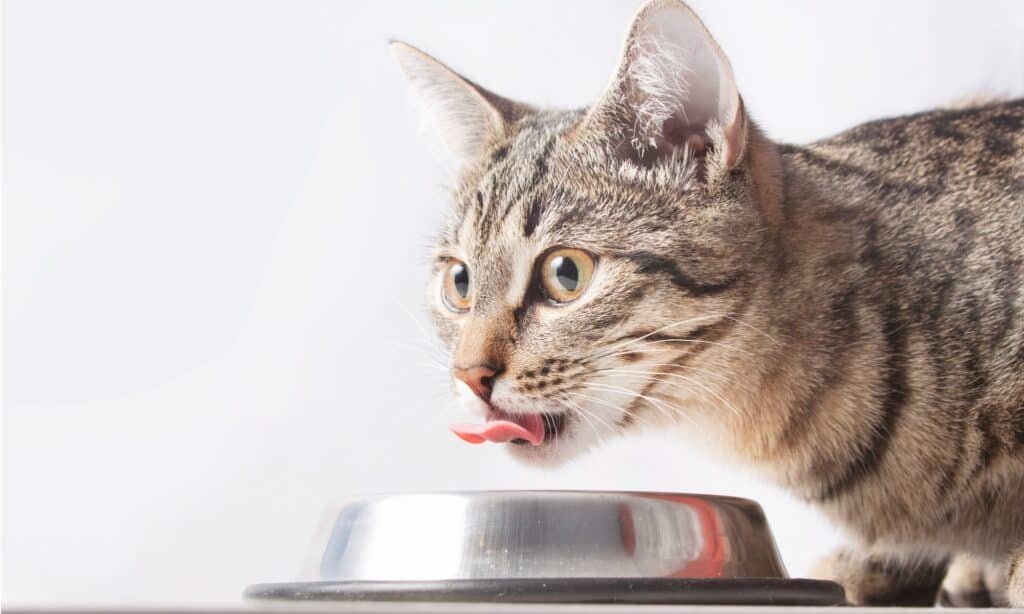Have you ever been preparing a delicious ham sandwich, only to look down and see your cat looking up at your meal with interest? You may wonder whether or not it is safe to feed cats ham, and if so, how much can they eat?
Ham is safe for cats to eat, but there are a few things you should know before you offer this snack to your feline friend. Let’s break down the details below!
Is Ham Safe For Cats To Eat?

Ham is safe for cats to eat as an occasional snack.
©iStock.com/Ukususha
Cats are obligate carnivores, so they rely on protein from animal tissue to get their vital nutrients. This means that they can safely eat meat in moderation, and this includes ham! However, there are a few safety guidelines to keep in mind when you are feeding your feline friend ham. Let’s break them down in detail below.
3 Things To Know Before Feeding Your Cat Ham
Ham is safe for cats to eat, but there are a few things you should keep in mind when serving it to your feline companion.
#1 They Should Only Eat A Small Amount
Ham is only safe for cats when offered in small servings. Ham should not be a staple in your cat’s diet, so this means that it will be considered a special treat. Your cat’s treat intake should make up no more than 10% of their daily caloric intake, so their serving of ham will need to reflect that. For reference, 1/4 of a slice of deli ham will typically fit into their caloric treat allowance.
Your cat should get all the protein and nutrients they need from a quality cat kibble.
#2 It Should Only Be An Occasional Treat
In addition to giving your cat a small serving of ham, you should also be sure that you are only giving your cat a sample of ham on occasion. Ham is high in sodium, so eating it too often can lead to an upset stomach or weight gain. We do not suggest giving your cat ham more than twice a week.
#4 It Should Be Free Of Any Seasonings or Dressing
Many styles of ham are seasoned with popular additives like garlic, onion, and honey. While these seasonings make the ham even more delicious, they are not safe for our feline family members to enjoy. Cats should only eat small servings of ham that are plain and free of any harmful seasonings.
Can Cats Eat Cold Cut Ham?

Your cat’s daily treat intake should make up no more than 10% of their daily calories consumed.
©iStock.com/Lightspruch
Cold cut ham or deli sliced ham is safe for cats to eat in moderation as long as it is free of any dressings or seasonings. If you know you will be offering your cat a piece of your sliced ham as an occasional treat, then we suggest going for the low sodium ham!
Can Kittens Eat Ham?
Kittens tend to have a more sensitive stomach than adult cats. For this reason, we do not suggest offering them any ham until they are at least 8 months of age or older. We also suggest monitoring your cat for 48 hours after you offer them their first serving of ham, and if they experience any GI upset, it may not be the best treat option for them.
Can Cats Eat Ham Bones?
Ham bones are not safe for cats to eat. Ham bones can be a choking hazard for our feline friends, and they can also lead to fatal intestinal blockages if they are consumed. Always be sure that your cat’s serving of ham is free of any bones to prevent any potential health complications.
Always reach out to your vet if you think your cat could have ingested a ham bone.
Can My Cat Get Sick From Eating Ham?
Cats can get sick from eating ham if they consume too large of a serving of ham, or if their serving of ham is seasoned with any harmful ingredients. While some cats will develop a minor case of GI upset that will resolve on its own, other cats can develop pancreatitis due to the ham’s high fat and sodium content. Pancreatitis is a condition that can develop when a cat consumes something that is high in fat, leading to painful inflammation of the pancreas.
A cat that is sick from eating ham may experience the following symptoms:
- Diarrhea
- Vomiting
- Lethargy
- Abdominal pain
- Decreased appetite
- Fever
- Hiding away
We suggest having your cat assessed by a vet if you notice the above symptoms, as this can point to an underlying GI complication from eating ham. Pancreatitis requires medical intervention to nurse them through, so it’s always best to be safe and seek veterinary care.
Final Thoughts On Ham For Cats
Ham is safe for cats when given in moderation and as an occasional treat. Be sure to review the safety tips we discussed above on how to give your cat ham, and you can offer your cat this safe treat the next time you make a ham sandwich!
The photo featured at the top of this post is © Lightspruch/Shutterstock.com
Thank you for reading! Have some feedback for us? Contact the AZ Animals editorial team.






